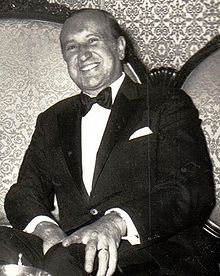Misael Pastrana Borrero
Misael Eduardo Pastrana Borrero (born November 14, 1923 in Neiva , † August 21, 1997 in Bogotá ) was a Colombian lawyer and the country's president from 1970 to 1974 .
As the son of Misael Pastrana and Elisa Borrero, he studied law at the Pontificia Universidad Javeriana in Bogotá and later at the Ferri Institute in Rome. He became a member of the conservative party Partido Conservador Colombiano and was appointed secretary at the Colombian Embassy to the Holy See under President Mariano Ospina Pérez . Later he was the private secretary of President Pérez. His successor Laureano Gómez appointed Pastrana as ambassador to Washington, an office Pastrana held from 1950 to 1952. From 1953 he was Secretary General of the Foreign Minister, from 1954 to 1956 as his country's representative at the United Nations. After his return to Colombia he taught at the Universidad Javeriana, in 1963 he was one of the founding members of the Faculty of Economics and became its first dean.
Under the second liberal presidency of Alberto Lleras Camargo , Pastrana Borrero was minister responsible for various business areas, first development minister, then he was responsible for public works and finally for finances. For the presidential elections in 1962 he did not run as a candidate, but held a managerial position at Celanese. From 1968 to 1970 he was ambassador to the United States . He ran as a candidate for the presidency and won on April 19, 1970, with 1,625,025 votes against Rojas Pinilla with 1,561,468. The small difference in the number of votes between the two candidates meant that the supporters of Rojas Pinilla contested the election and the electoral committee only declared Pastrana the official election winner after some time. The guerrilla movement Movimiento 19 de Abril ( Movement April 19 ) refers on their behalf to election day. Pastrana was the last president who was alternately appointed by both parties after an agreement in 1958 with the Partido Liberal Colombiano .
During Pastrana's presidency, the state's share of the ownership of the country's oil production increased and the fight against insurgents was intensified (including Operation Anorí ), but Pastrana was unable to pacify the country permanently. The transport infrastructure has also been improved through repairs, construction and upgrading of roads, railways and airports. Electronic data processing was introduced in financial management. The number of employees rose sharply, and the voting age was lowered to 18 years. Even after his presidency he continued to work in a leading position for the Conservative party and criticized Ernesto Samper , whose election in 1994 Pastrana linked to election donations for Samper by the drug cartels.
Pastrana Borrero married María Cristina Arango Vega on February 24, 1952 in Bogotá, with whom he had four children (Juan Carlos, Andrés, Jaime and María Cristina). His son Andrés Pastrana Arango was elected president in the subsequent 1998 election after Samper's defeat in 1994, which Misael Pastrana was no longer allowed to witness because of his death the previous year.
Web links
- Biography on the website of the President of the Republic of Colombia (Spanish)
- Biography in the Biblioteca Virtual del Banco de la República by Luz Stella Tocancipa (Spanish)
- Entry on rulers.org (English)
| predecessor | Office | successor |
|---|---|---|
| Carlos Lleras Restrepo |
President of Colombia 1970–1974 |
Alfonso López Michelsen |
| personal data | |
|---|---|
| SURNAME | Pastrana Borrero, Misael |
| ALTERNATIVE NAMES | Pastrana Borrero, Misael Eduardo |
| BRIEF DESCRIPTION | Colombian politician, President of Colombia |
| DATE OF BIRTH | November 14, 1923 |
| PLACE OF BIRTH | Neiva |
| DATE OF DEATH | August 21, 1997 |
| Place of death | Bogotá |
